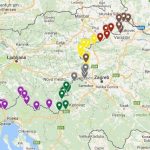As Poslovni Dnevnik/Sergej Novosel Vuckovic writes, spring is just around the corner, summer is coming, the tourist season is rapidly approaching, and most of us are far from preparing to go on holiday somewhere abroad. The coronavirus pandemic continues to reign strong, plans are almost impossible to make, talk of covid passports, EU restrictions changing in the blink of an eye, airlines scrapping routes at the drop of a hat and potentially getting stuck somewhere are all too much for many.
However, it doesn´t cost us anything whatsoever to sit down and think about whether we´ll travel outside of Croatia this summer season at all, and when it comes to that, it seems that the Croats are at the top of the world, as are the Slovenes. As the research undertaken by WIN International, the leading global market research association, suggests, Croats and their neighbours are among the most reassured of all when it comes to the idea of going off somewhere abroad this year.
The results of this global scan of attitudes and beliefs towards coronavirus vaccines, the ability of governments to resolve the ongoing public health crisis, the capacity of healthcare systems and the likelihood of travel in Croatia this year were published by the Mediana Fides research agency.
“Globally, when it comes to travel for either leisure or for work this year, 65 percent and then 77 percent of respondents consider the idea unfeasible. The survey was conducted in late 2020 on a sample of 26,579 people across 32 countries,” they stated from Mediana Fides. It turned out that in Croatia´s immediate region, the Slovenes are the most optimistic about foreign travel for their holidays (with 58 percent of respondents considering it very likely or probable), followed by Croatian travellers (with 43 percent of respondents saying that such a trip in 2021 is very likely or probable), followed then by Serbia (37 percent).
When it comes to the old “business, not pleasure” sort of trips, then those same three countries are in the same readiness for business travel – Serbia (22 percent), Slovenia (21 percent) and Croatia (20 percent).
As for the rest of the world, India and Nigeria have jointly taken the lead with scores above 50 percent in terms of the probability of going abroad. Mediana draws attention to the case of China: “It has one of the highest levels of people willing to get vaccinated and at the same time one of the lowest levels of intention to travel in 2021.” From this it could be concluded that tourists coming from the Far East to Croatia this year probably won´t happen, be they vaccinated or not.
Across the world, according to the findings of the same piece of research, 7 out of 10 people, regardless of their gender and/or age, agreed with coronavirus vaccination. When looking at the level of education, it turns out that those with the lowest level of education and the unemployed are the least interested in getting vaccinated. When it comes to different parts of the world, the Asia-Pacific region with 80 percent of the population agreeing with and wanting coronavirus vaccinations is in the lead, and by countries it looks like this: Vietnam (98 percent), followed by China and India with 91 percent of their respective populations ready and willing to vaccinate against the novel virus.
Here at home in Europe, there is an unusual case with neighbouring Serbia, which boasts the second highest rate of vaccination of the population on the Old Continent, but there, a surprising 62 percent of respondents are still not convinced when it comes to coronavirus vaccination.
Here in Croatia, a similar thing can be said – 59 percent of Croatian residents don´t have much trust and would actually refuse to be vaccinated. As little as 13 percent of Croats have stated that they would definitely be vaccinated. France is at 56 percent, and in neighbouring Slovenia, 47 percent of people would not want to receive a vaccination against the novel coronavirus.
“Given that each country must vaccinate 65 percent of its population in order to achieve collective immunity, it is necessary to resort to informing the public and raising awareness of the importance of vaccination,” they stated from Mediana Fides. This is somewhat correlated with the assessment of the surveyed citizens according to the ability of their governments to cope with the current health crisis.
In Serbia, they rate it the worst (only 30 percent of the population thinks that the Serbian Government has handled things well), 33 percent of people in Slovenia and 39 percent of people in Croatia believe that the work of their governing bodies in the fight against the coronavirus is positive.
It can also be read from the same survey that regarding the issue of the capacities of the healthcare system, only 36 percent of the population(s) of Serbia and Croatia and 46 percent of the population of Slovenia rate it as positive.
If vaccination against the new coronavirus becomes mandatory in any sense, it will be interesting to see how many Croatian 2021 travellers will be inclined to accept the vaccine despite their suspicions in order to have an easier life when crossing borderd and boarding planes.
For the latest travel info, bookmark our main travel info article, which is updated daily.
Read the Croatian Travel Update in your language – now available in 24 languages.
Join the Total Croatia Travel INFO Viber community.











